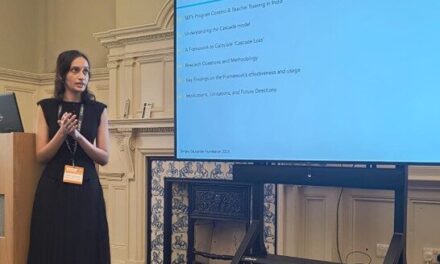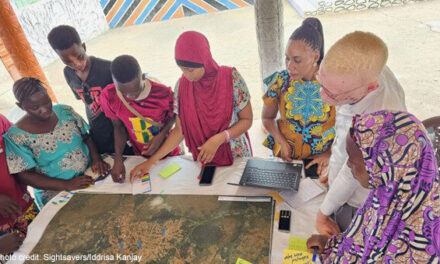This blog was written after the UKFIET September 2025 conference by the theme convenors of ‘Systems thinking’, one of seven conference themes: Mathilde Nicolai, Cambridge Education and Yifei Yan, University of Southampton.
Along with other panellists, Mathilde and Yifei will be sharing some highlights from discussions in a 1-hour webinar on Wednesday 15 October – this is open to all, whether you were able to attend the conference or not. Register here to join.
When presenting the overview of the ‘Systems Thinking’ theme highlights weeks before the UKFIET 2025 Conference, we were confident and excited that our 22 sessions – including 9 paper and quick fire panels, 8 symposia and 5 creative sessions – would significantly enrich our understanding of system thinking and how it can help drive transformative change in education systems. Thanks to all participants who joined us as presenters, discussants, chairs, volunteers and, last but not least, engaged audience… our expectations were more than satisfied.
As co-conveners, we are heartened and humbled to see how these sessions – as well as our earlier call for contributions – were received with overwhelming enthusiasm. In the rapidly changing educational landscape today, where the clock for meeting SDG4 by 2030 is ticking, and yet the entire development sector is facing major constraints, such knowledge exchanged, partnerships strengthened, and innovations shared during the three days in Oxford are even more timely and valuable. More importantly, their impact will continue to grow as these reflections and learning are catalysed into actions in our continuous pursuit of making education systems work better – as scholars, policymakers and practitioners across diverse countries, disciplines and governance levels.
Recognising that systems thinking matters
The first message jointly reinforced by the sessions under this sub-theme is clear: systems thinking matters – perhaps even more in a context of limited funding that we are facing. Most of the research and sharing here is grounded on the recognition that when policy interventions carry high stakes, impacting the learning of thousands, if not millions, of children, no individual actors within any education systems would possess all the skills and capabilities required to realise the intended goals of policies and reforms on their own. Multiple stakeholders therefore need to work together within the system. Their interests, incentives and capacities accordingly need to be identified, communicated and synergised through comprehensive and inclusive partnerships.
Some of the papers and symposia have filled a further gap by zooming in on the so-called middle-tier educational bureaucrats as an under-investigated category of policy actors at the system level. Fresh examples from India and South Africa, among others, not only helped tease out the similarities and key differences between their work and that of the national-level bureaucrats on the one hand and the “street-level bureaucrats” at the frontline on the other. Beyond that, presenters also gave a vivid account of the challenges they face, as well as the support they need as the key nodes that link up the top and ground levels. Other key reflections were also made on results-based financing, agile technical assistance, and a rethinking of donor–state relationships to reposition national education systems at the centre.
Highlighting successes from the Global South
Examples mentioned above have closely examined the various challenges faced by education systems, from the capacity deficits of middle-tier bureaucrats to the power imbalance during reform negotiations. Yet, it is important to highlight that our sessions also featured several impressive success stories from the Global South – not only at the pilot phase, but also how they have been effectively scaled up to improve student learning outcomes at a broader scale. Phased and iterative design of reform packages, incorporation of different stakeholders’ voices and expertise, and adaptation to specific contexts that can be very different from the pilot origins are some of the common themes underlying the cases examined.
Their presence within this theme is especially welcome as it can help further decolonise the knowledge production of our field, where policy learning has long taken a single restrictive direction from the Global North to the South. Not only will other Global South education systems facing similar resource or structural constraints find them to be particularly encouraging and inspirational, but these positive cases may even unleash more potentials of South-to-North policy learning as recently observed in other sectors of service delivery.
Raising questions that still demand an answer
While our sessions addressed many of the key issues pertaining to the financing, politics and political economy of education systems and their reforms, more questions were raised during our stimulating exchange and dialogue for which the answers are yet to be elucidated. To illustrate, the future of aid, and how to respond to growing funding constraints with more efficient, agile, and localised approaches, remains under-defined and -specified.
Most importantly, for many of us who get to hear about the tragic happenings in Gaza primarily through (limited) media coverage, the keynote speech delivered by Professor Ahmed Kamal Junina from Al-Aqsa University (alongside his subsequent commentary in The Independent) gave us a heartbreaking yet powerful first-hand account of the “education reduced to fragments” reality experienced by more than half a million of children there. It is genuinely admirable that teaching and learning activities manage to continue, albeit with severe constraints, through creative methods. However, to the extent that what children in Gaza are going through is systemic denial and deprivation of their right to education, what can and should the global community do to alleviate this dire situation?
Until a satisfying answer emerges, not giving up on or shunning away from questioning and exploring is among the least one can do as fellow citizens of this global community.
Continuing the dialogue: An invitation to join our October webinar
Although the UKFIET 2025 Conference has come to an end, we see it more as the end of a beginning for what can continue to be an engaging and transformative conversation on systems thinking. As the immediate next step, we cordially invite you to join our webinar on Wednesday 15th October 13.00-14.00 (UK time).
This webinar will feature four speakers from our sessions: Liveness Mwale from the Malawi Ministry of Education, Olya Homonchuk from ODI Global, Rishi Rajvanshi from Room to Read and Maha Shuayb from the University of Cambridge/ Centre of Lebanese Studies. They will recap the highlights of their presented work, share their conference experience, and discuss how this experience is informing and inspiring the next steps of their research and practice.



